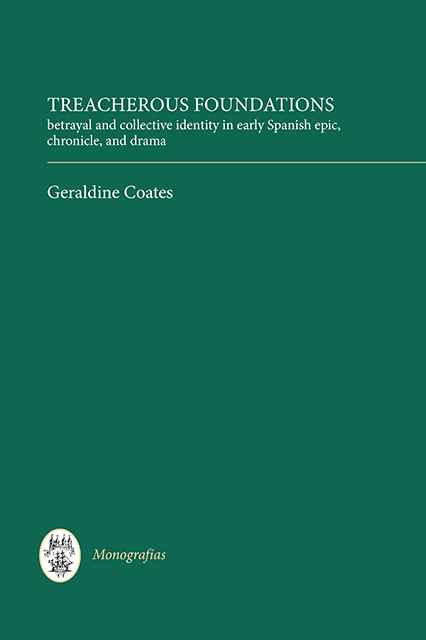 Treacherous Foundations
Treacherous Foundations Book contents
- Frontmatter
- Contents
- Dedication
- Acknowledgements
- Abbreviations
- 1 Introduction
- 2 Trauma and Triumph in the Poema de Fernán González
- 3 ‘Et si desto menguas’: Imperial Decline in the Estoria de España
- 4 ¿Traición tan provada? Treachery Refashioned in Juan de la Cueva
- 5 The Historical Vision of Lope de Vega: Castile and Castidad
- 6 Conclusion
- Works Cited
- Index
4 - ¿Traición tan provada? Treachery Refashioned in Juan de la Cueva
Published online by Cambridge University Press: 07 March 2023
- Frontmatter
- Contents
- Dedication
- Acknowledgements
- Abbreviations
- 1 Introduction
- 2 Trauma and Triumph in the Poema de Fernán González
- 3 ‘Et si desto menguas’: Imperial Decline in the Estoria de España
- 4 ¿Traición tan provada? Treachery Refashioned in Juan de la Cueva
- 5 The Historical Vision of Lope de Vega: Castile and Castidad
- 6 Conclusion
- Works Cited
- Index
Summary
Morality and Its Limits
As we move from the medieval world to the Golden Age, the chronicler Florián de Ocampo provides a bridge in literary and historiographical terms. His Crónica general de España of 1541, which revived the heroic genealogy of Spain and its foundational epic tales when Spain was at the height of success in its overseas conquests, was the principal literary source for the historical theatre of the playwright Juan de la Cueva (1543-1612). Both Ocampo and Cueva interpret history in a way that will showcase its meaning for the wider group but whereas Ocampo concentrates upon the glorious nature of the past to inflate the ego of the present (Tate 1954: 16), Cueva foresees problems in fostering this ego without paying heed to justice. The term ego is an appropriate one to use. This was a time of dramatic adjustments to peninsular identities and group consciousness as the preeminence of Castile met an increasing emphasis on the idea of Spain. In the same way as the Freudian ego negotiates with the external world, is modified by contact with it, and brings its influence to bear on the passionate, instinctive id (1984b: 363-64), so too the Castilian ego as perceived by Cueva is one which is to be informed by reason, common sense, and restraint.
When Cueva’s historical plays were represented in the Sevilian corrales, from 1579-81 (Shergold 1955: 1), Philip II was at the height of imperial success. The effects of the empire would have been hard to ignore in sixteenthcentury Seville, then a thriving port and commercial centre for Spain. Trade was regulated at the Casa de Contratación between Spain and her colonies, while an edict of 1503 by the Crown of Castile declared that all ships bound for the New World from Europe must pass through Seville en route (Perry 1980: 1). Mary Elizabeth Perry confirms the preeminence of the city port by suggesting that because of Seville’s unique ties to the central monarchy ‘the fortunes of the city rose and fell with those of the Habsburg rulers. Seville reveals in microcosm the relationship between city oligarchy and central monarchy and the tensions between political authority and those who defy it’ (1980: 1). Philip’s territorial campaign led him to extremes of judgement, behaviour, and policy which were not always favourably viewed by the other European States, nor indeed within Spain itself.
- Type
- Chapter
- Information
- Treacherous FoundationsBetrayal and Collective Identity in Early Spanish Epic, Chronicle, and Drama, pp. 113 - 152Publisher: Boydell & BrewerPrint publication year: 2009


